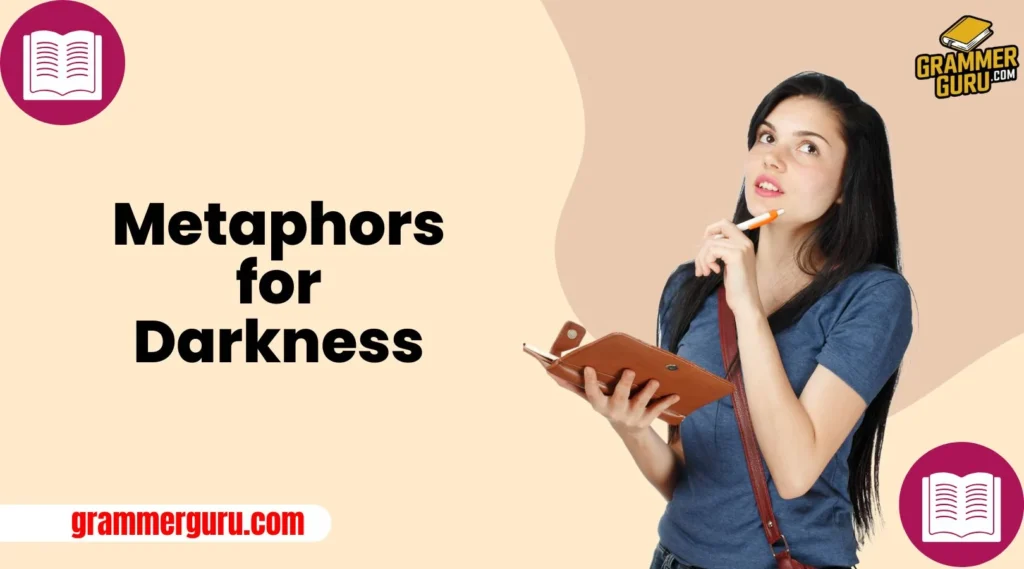Darkness often carries deep meaning, evoking mystery, fear, or even comfort. It can represent the unknown, sadness, or a hidden truth. Writers and poets frequently use metaphors for darkness to create vivid imagery and stir emotions.
Whether describing physical darkness or emotional states, these metaphors bring depth and richness to storytelling. In this article, you’ll find 20 powerful metaphors for darkness, each with a definition, example, and explanation.
By understanding and using these metaphors, you can express emotions and ideas more effectively, making your words resonate with warmth and care.
What Is a Metaphor for Darkness?
A metaphor for darkness is a phrase that compares darkness to something else without using “like” or “as.” These metaphors help create stronger imagery and deeper meaning in writing.
Darkness can symbolize fear, mystery, ignorance, sadness, or secrecy, depending on the context. By using thoughtful and poetic comparisons, writers can make descriptions more vivid and emotionally engaging.
1. Darkness Is a Blanket
This metaphor suggests that darkness covers everything like a soft, heavy fabric, wrapping the world in silence and obscurity.
Definition: Darkness is compared to a blanket that envelops and hides everything from view.
In a Sentence: “As the sun set, a blanket of darkness covered the village, hiding its streets in shadow.”
Example: Imagine a cold winter night when you pull a thick blanket over yourself. The world outside disappears, just as darkness hides everything from sight.
Explanation: This metaphor conveys comfort or concealment, depending on the context. Darkness, like a blanket, can feel protective or isolating, creating a mood of mystery or calm.
Other Ways to Say It:
- Darkness is a veil
- Darkness is a shroud
- Darkness is a cloak
- Darkness is a covering
- Darkness is an embrace
2. Darkness Is a Shadowy Figure
This metaphor paints darkness as a lurking presence, like a mysterious or menacing figure in the night.
Definition: Darkness is imagined as a shadowy figure moving silently, creating a sense of suspense or fear.
In a Sentence: “Darkness crept into the room like a shadowy figure, filling the corners with mystery.”
Example: Think of a dimly lit alley where shadows shift and stretch. Darkness moves like an unknown figure, making you wonder what might be hiding within it.
Explanation: This metaphor emphasizes the mystery and eeriness of darkness. It suggests that something unseen and unknown is lurking, adding to the tension in a story.
Other Ways to Say It:
- Darkness is a phantom
- Darkness is a ghostly presence
- Darkness is a silent intruder
- Darkness is a lurking shadow
- Darkness is a creeping mist
3. Darkness Is a Bottomless Abyss
This metaphor presents darkness as a vast, endless space, symbolizing the unknown or despair.
Definition: Darkness is compared to an abyss—deep and without end, representing emptiness or fear.
In a Sentence: “She stared into the darkness, feeling as though she were gazing into a bottomless abyss.”
Example: Imagine standing at the edge of a deep cave where the blackness stretches infinitely downward. This image captures the feeling of being lost in darkness.
Explanation: This metaphor conveys a sense of depth, emptiness, or hopelessness, often used to describe fear or emotional struggles.
Other Ways to Say It:
- Darkness is a chasm
- Darkness is an endless void
- Darkness is a deep pit
- Darkness is a black hole
- Darkness is an infinite expanse
4. Darkness Is a Silent Thief
This metaphor suggests that darkness steals away light and clarity, just like a thief moving unseen in the night.
Definition: Darkness is compared to a thief that arrives quietly and takes away vision and certainty.
In a Sentence: “As the last candle flickered out, darkness crept in like a silent thief, stealing the warmth of the light.”
Example: Imagine someone sneaking into a house while everyone sleeps, taking away valuable things without a sound. Darkness does the same, removing light and clarity before anyone notices.
Explanation: This metaphor highlights how sudden and unnoticed darkness can be, evoking feelings of mystery, loss, or even fear.
Other Ways to Say It:
- Darkness is a robber
- Darkness is a sneaky intruder
- Darkness is a silent burglar
- Darkness is a cunning shadow
- Darkness is an unseen hand
5. Darkness Is a Heavy Curtain
This metaphor suggests that darkness falls quickly and completely, like a thick, heavy curtain being drawn across a stage.
Definition: Darkness is compared to a curtain that blocks out everything, leaving only blackness behind.
In a Sentence: “The storm clouds thickened, and soon, a heavy curtain of darkness draped over the city.”
Example: Think of a theater when the play is over—the lights dim, and a large, dark curtain closes off the scene from the audience. Darkness works in the same way.
Explanation: This metaphor creates a sense of sudden transition, emphasizing how quickly and completely darkness can take over.
Other Ways to Say It:
- Darkness is a wall of shadows
- Darkness is a thick veil
- Darkness is a draping cloak
- Darkness is a closing stage curtain
- Darkness is a falling shade
6. Darkness Is an Ocean
This metaphor describes darkness as deep, vast, and overwhelming, like an endless sea.
Definition: Darkness is compared to an ocean that stretches far and deep, making one feel lost or submerged.
In a Sentence: “He felt himself sinking into an ocean of darkness, unable to find the surface.”
Example: Picture a vast, black sea at night with no land in sight. The darkness feels immense, swallowing everything in its depths.
Explanation: This metaphor suggests immensity, depth, and possibly even suffocation, symbolizing feeling lost, afraid, or isolated.
Other Ways to Say It:
- Darkness is a deep sea
- Darkness is a boundless tide
- Darkness is a drowning wave
- Darkness is an endless depth
- Darkness is a black ocean
7. Darkness Is a Monster
This metaphor portrays darkness as something alive and frightening, like a lurking beast.
Definition: Darkness is imagined as a monster that hides in the night, waiting to consume light and hope.
In a Sentence: “The darkness stretched its claws across the sky, swallowing the last traces of twilight.”
Example: Imagine a shadowy creature with glowing eyes, creeping forward as night falls. This metaphor brings out the fearsome nature of darkness.
Explanation: This metaphor plays on the fear of the unknown, making darkness feel threatening or overpowering.
Other Ways to Say It:
- Darkness is a beast
- Darkness is a lurking predator
- Darkness is a hungry wolf
- Darkness is a shadowy demon
- Darkness is a creeping nightmare
8. Darkness Is a Whisper
This metaphor suggests that darkness arrives gently and quietly, like a soft voice in the night.
Definition: Darkness is compared to a whisper that spreads softly, filling spaces without making a sound.
In a Sentence: “The night fell like a whisper, slipping into every corner of the house.”
Example: Think of the way a whisper moves through a room—quiet yet powerful. Darkness behaves in the same way, spreading subtly but completely.
Explanation: This metaphor portrays darkness as gentle rather than threatening, emphasizing stillness, mystery, and quietness.
Other Ways to Say It:
- Darkness is a hushed secret
- Darkness is a silent breath
- Darkness is a creeping hush
- Darkness is a soft sigh
- Darkness is a drifting murmur
9. Darkness Is a Cage
This metaphor portrays darkness as something that traps and confines, making escape impossible.
Definition: Darkness is compared to a cage that surrounds and limits movement or freedom.
In a Sentence: “He felt trapped in a cage of darkness, unable to find his way out.”
Example: Imagine being locked in a small space with no light. You can’t see an exit, and the walls feel like they’re closing in—this is how darkness can feel emotionally or physically.
Explanation: This metaphor is often used to describe hopelessness, fear, or feeling restricted, as if darkness is something that holds a person captive.
Other Ways to Say It:
- Darkness is a prison
- Darkness is a locked room
- Darkness is a suffocating box
- Darkness is an iron grip
- Darkness is a heavy chain
10. Darkness Is a Poison
This metaphor suggests that darkness spreads like a toxin, consuming everything in its path.
Definition: Darkness is compared to poison that slowly infiltrates and weakens the surroundings.
In a Sentence: “A poison of darkness seeped into his thoughts, clouding his mind with fear.”
Example: Imagine a drop of ink spreading through a glass of water, making everything murky. Darkness can feel just as overwhelming, creeping in until everything is consumed.
Explanation: This metaphor is often used to describe negative emotions, such as depression or fear, which grow and take over, just like poison.
Other Ways to Say It:
- Darkness is venom
- Darkness is a toxic mist
- Darkness is a creeping plague
- Darkness is a slow-acting drug
- Darkness is an invisible sickness
11. Darkness Is a Storm
This metaphor makes darkness feel powerful, turbulent, and overwhelming, just like a storm.
Definition: Darkness is compared to a storm that covers the sky, bringing chaos and destruction.
In a Sentence: “A storm of darkness raged across the sky, swallowing the last bits of daylight.”
Example: Think of a sudden thunderstorm rolling in—the sky turns black, and everything feels wild and unpredictable. Darkness can feel just as intense and consuming.
Explanation: This metaphor highlights unpredictability, destruction, or emotional turmoil, making darkness seem active and forceful.
Other Ways to Say It:
- Darkness is a whirlwind
- Darkness is a raging tempest
- Darkness is a thundercloud
- Darkness is a violent wave
- Darkness is a black hurricane
12. Darkness Is a Cold Touch
This metaphor suggests that darkness feels physical, like something reaching out with icy fingers.
Definition: Darkness is compared to a cold touch that sends shivers down the spine.
In a Sentence: “A cold touch of darkness brushed against her skin, making her shiver.”
Example: Imagine stepping into a dark, abandoned house where the air feels chilled and unwelcoming—as if something is touching you.
Explanation: This metaphor emphasizes the physical sensation of fear or discomfort, making darkness feel almost alive.
Other Ways to Say It:
- Darkness is an icy breath
- Darkness is a frozen hand
- Darkness is a chilling presence
- Darkness is a ghostly caress
- Darkness is a creeping frost
13. Darkness Is an Empty Road
This metaphor creates an image of isolation and uncertainty, where darkness feels like a lonely, unending journey.
Definition: Darkness is compared to an empty road stretching endlessly with no clear destination.
In a Sentence: “He walked along an empty road of darkness, unsure where it would lead.”
Example: Picture walking alone down a deserted highway at night, with nothing but shadows stretching ahead. Darkness can feel just as lonely and directionless.
Explanation: This metaphor is often used to describe confusion, loneliness, or a journey into the unknown.
Other Ways to Say It:
- Darkness is a winding path
- Darkness is an endless tunnel
- Darkness is a silent highway
- Darkness is an abandoned street
- Darkness is a road without end
14. Darkness Is a Black Hole
This metaphor suggests that darkness pulls things in and never lets them escape, just like a black hole in space.
Definition: Darkness is compared to a black hole that swallows everything, leaving no trace behind.
In a Sentence: “Her happiness disappeared into the black hole of darkness, never to be found again.”
Example: Imagine a force so strong that light, sound, and even hope vanish the moment they enter—this is how darkness can feel when it overwhelms emotions or thoughts.
Explanation: This metaphor describes deep despair, overwhelming sadness, or the feeling of being consumed by negativity.
Other Ways to Say It:
- Darkness is a swallowing void
- Darkness is an endless chasm
- Darkness is a lightless pit
- Darkness is a consuming force
- Darkness is an inescapable trap
15. Darkness Is a Sleeping Giant
This metaphor makes darkness seem powerful but quiet, waiting to awaken at any moment.
Definition: Darkness is compared to a giant that sleeps during the day but rises as night falls.
In a Sentence: “Darkness, like a sleeping giant, stretched across the land as the sun disappeared.”
Example: Imagine a massive creature that rests silently, but the moment it stirs, its presence dominates the entire space—that’s how darkness takes over at night.
Explanation: This metaphor adds a sense of power and inevitability to darkness, showing it as something that always returns, no matter what.
Other Ways to Say It:
- Darkness is a resting beast
- Darkness is a waiting titan
- Darkness is a quiet force
- Darkness is an unseen power
- Darkness is a slumbering shadow
16. Darkness Is a Cloak
This metaphor suggests that darkness covers everything, hiding what lies beneath.
Definition: Darkness is compared to a cloak that drapes over the world, concealing everything from view.
In a Sentence: “Darkness wrapped around the city like a thick cloak, swallowing all signs of life.”
Example: Imagine a long, flowing cloak that covers someone completely, making them invisible. Darkness does the same, hiding details and creating mystery.
Explanation: This metaphor is often used to describe secrecy, protection, or mystery, as darkness can both conceal and shelter.
Other Ways to Say It:
- Darkness is a shroud
- Darkness is a veil
- Darkness is a shadowy mantle
- Darkness is a concealing blanket
- Darkness is a night’s embrace
17. Darkness Is a Bottomless Pit
This metaphor suggests that darkness has no end, making it feel deep and inescapable.
Definition: Darkness is compared to a pit that has no bottom, pulling everything into its depths.
In a Sentence: “She felt herself falling into a bottomless pit of darkness, with no way to escape.”
Example: Picture a hole so deep that you can’t see the bottom, and no matter how far you fall, it never ends. That’s how overwhelming darkness can feel.
Explanation: This metaphor is often used to describe deep despair, fear, or hopelessness, showing darkness as something that traps and consumes.
Other Ways to Say It:
- Darkness is an endless abyss
- Darkness is a deep chasm
- Darkness is a black void
- Darkness is a swallowing pit
- Darkness is a never-ending tunnel
18. Darkness Is an Echoing Cave
This metaphor makes darkness feel vast, empty, and full of eerie sounds, like a cave.
Definition: Darkness is compared to a cave where sound bounces around, creating an eerie and hollow atmosphere.
In a Sentence: “The darkness felt like an echoing cave, amplifying every tiny sound and movement.”
Example: Imagine stepping into a dark cave where your voice echoes, but you can’t see what’s ahead. Darkness can feel the same—deep, mysterious, and uncertain.
Explanation: This metaphor conveys loneliness, mystery, and an unsettling sense of the unknown, making darkness feel both vast and enclosing.
Other Ways to Say It:
- Darkness is a hollow chamber
- Darkness is a yawning cavern
- Darkness is a whispering tunnel
- Darkness is a silent grotto
- Darkness is an endless cave
19. Darkness Is a Sleeping Serpent
This metaphor makes darkness seem alive and waiting, like a coiled serpent ready to strike.
Definition: Darkness is compared to a snake that lies still but can suddenly move and consume its surroundings.
In a Sentence: “The darkness slithered through the alley like a sleeping serpent slowly awakening.”
Example: Imagine a snake curled up in the shadows, barely moving, but always present. Darkness can feel like something lurking and waiting in silence.
Explanation: This metaphor adds a sense of quiet danger or anticipation, making darkness feel mysterious and possibly threatening.
Other Ways to Say It:
- Darkness is a lurking shadow
- Darkness is a hidden predator
- Darkness is a coiled viper
- Darkness is a slithering fear
- Darkness is a creeping danger
20. Darkness Is an Old Friend
This metaphor suggests that darkness can feel familiar, comforting, and even welcoming.
Definition: Darkness is compared to a friend that stays close, offering quiet and solitude.
In a Sentence: “As she sat alone in the dim room, she welcomed the darkness like an old friend.”
Example: Think of how some people enjoy quiet nights, peaceful solitude, or time for deep thinking. Darkness can be soothing rather than frightening.
Explanation: This metaphor highlights the comforting side of darkness, showing it as a space for reflection, rest, or personal time.
Other Ways to Say It:
- Darkness is a gentle companion
- Darkness is a silent guardian
- Darkness is a soothing presence
- Darkness is a peaceful retreat
- Darkness is a familiar embrace
Other Ways to Say “Metaphors for Darkness”
- Symbolic Expressions of Darkness
- Figurative Descriptions of Darkness
- Darkness Comparisons in Writing
- Imagery for Darkness
- Creative Ways to Describe Darkness
Final Thoughts
Metaphors for darkness bring depth and emotion to language. Whether expressing mystery, fear, sadness, or comfort, these comparisons make writing more vivid and engaging.
Understanding these metaphors allows you to communicate complex emotions in a meaningful way. So, next time you describe darkness, consider using one of these powerful metaphors to create a stronger impact.
FAQs
1. Why do writers use metaphors for darkness?
Metaphors make descriptions stronger, more emotional, and more memorable, helping readers visualize and feel the scene.
2. Can darkness be both positive and negative in metaphors?
Yes! Darkness can symbolize fear and the unknown, but it can also represent comfort, peace, or mystery.
3. What’s the difference between “darkness is a blanket” and “darkness is a monster”?
“Darkness is a blanket” suggests comfort and protection, while “darkness is a monster” creates fear and danger. The metaphor changes the mood depending on the comparison.
4. How do I choose the right metaphor for my writing?
Think about what emotion you want to convey—fear, peace, mystery, sadness, or power—and pick a metaphor that matches.
5. How can I use these metaphors in everyday conversation?
These metaphors can be used in stories, poetry, or even casual descriptions, like saying, “The darkness wrapped around us like a heavy cloak.”

Emma Brooke is the writer and founder of Grammer Guru, a platform designed to help individuals refine their grammar, writing, and communication skills. With a deep love for language and a talent for simplifying complex grammar rules, Emma provides insightful tips and practical guidance for writers, students, and professionals











